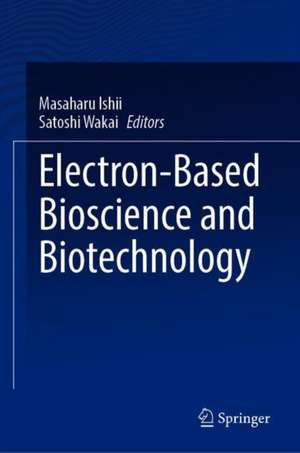Electron-Based Bioscience and Biotechnology
Editat de Masaharu Ishii, Satoshi Wakaien Limba Engleză Hardback – 8 sep 2020
| Toate formatele și edițiile | Preț | Express |
|---|---|---|
| Paperback (1) | 637.59 lei 6-8 săpt. | |
| Springer Nature Singapore – 9 sep 2021 | 637.59 lei 6-8 săpt. | |
| Hardback (1) | 643.84 lei 6-8 săpt. | |
| Springer Nature Singapore – 8 sep 2020 | 643.84 lei 6-8 săpt. |
Preț: 643.84 lei
Preț vechi: 757.46 lei
-15% Nou
Puncte Express: 966
Preț estimativ în valută:
123.24€ • 133.91$ • 103.59£
123.24€ • 133.91$ • 103.59£
Carte tipărită la comandă
Livrare economică 21 aprilie-05 mai
Preluare comenzi: 021 569.72.76
Specificații
ISBN-13: 9789811547621
ISBN-10: 9811547629
Ilustrații: VIII, 229 p. 96 illus., 46 illus. in color.
Dimensiuni: 155 x 235 mm
Greutate: 0.51 kg
Ediția:1st ed. 2020
Editura: Springer Nature Singapore
Colecția Springer
Locul publicării:Singapore, Singapore
ISBN-10: 9811547629
Ilustrații: VIII, 229 p. 96 illus., 46 illus. in color.
Dimensiuni: 155 x 235 mm
Greutate: 0.51 kg
Ediția:1st ed. 2020
Editura: Springer Nature Singapore
Colecția Springer
Locul publicării:Singapore, Singapore
Cuprins
Part I. Electron based Bioscience.- Chapter 1: (Tentative) Latest knowledges of (electro)microbiology.- Chapter 2: Importance of electron flow in (micro)biological metabolism.- Chapter 3: Extracellular electron transfer in bioelectrochemically active microorganisms.- Chapter 4: Direct interspecies electron transfer.- Chapter 5: Extracellular electron uptake mechanisms by sulfate reducing bacteria.- Chapter 6: Conversion of electric energy into life energy.- Part II. Electron based Biotechnology.- Chapter 7: Electrochemical interactions between microorganisms and conductive particles- Chapter 8: Bioelectrochemical reversible interconversion in the 2H+/H2 and CO2/formate redox systems and its importance in forthcoming energy system.- Chapter 9: Application of enzymatic reactions involving electron transfer for the production of useful chemicals.- Chapter 10: Fatty acid production of thraustochytrids and cellular redox balance.- Chapter 11: Control of microbial metabolisms by electrochemical cultivation method.- Part III. Electron based Biocorrosion.- Chapter 12: Microbiologically influenced corrosion.- Chapter 13: Electrochemistry on Corrosion Engineering.- Chapter 14: Microorganisms inducing microbiologically influenced corrosion.- Chapter 15: Electron flow rate in the corrosion and its application.- Chapter 16: Biocorrosion and souring in the crude oil production process.- Chapter 17: Metallurgical factors effect on bacterial adhesion and bio-corrosion.
Notă biografică
Masaharu Ishi, Ph.D., is a Professor at the Laboratory of Applied Microbiology, Department of Biotechnology, Graduate School of Agricultural and Life Sciences, University of Tokyo. Holding a Ph.D. from the University of Tokyo, his work focuses on the energy and carbon metabolisms in various microorganisms with special emphasis on hydrogen-oxidizing bacteria (Hydrogenobacter thermophilus and Hydrogenophius thermoluteolus).
Satoshi Wakai, Ph.D., is a Scientist at the Institute for Extra-cutting-edge Science and Technology Avant-garde Research (X-star), Japan Agency for Marine-Earth Science and Technology (JAMSTEC), Yokosuka, Japan, and a Guest Associate Professor at the Graduate School of Science, Technology, and Innovation, Kobe University, Japan. He holds a Ph.D. from Okayama University and is currently an associate editor for Microbes and Environments (an open access journal on microbial ecology). His work focuses on the development of diagnostic technologies and molecular mechanisms in microbiologically influenced corrosion, energy conversion of extremophiles, and metabolic engineering for the microbiological production of useful chemicals.
Satoshi Wakai, Ph.D., is a Scientist at the Institute for Extra-cutting-edge Science and Technology Avant-garde Research (X-star), Japan Agency for Marine-Earth Science and Technology (JAMSTEC), Yokosuka, Japan, and a Guest Associate Professor at the Graduate School of Science, Technology, and Innovation, Kobe University, Japan. He holds a Ph.D. from Okayama University and is currently an associate editor for Microbes and Environments (an open access journal on microbial ecology). His work focuses on the development of diagnostic technologies and molecular mechanisms in microbiologically influenced corrosion, energy conversion of extremophiles, and metabolic engineering for the microbiological production of useful chemicals.
Textul de pe ultima copertă
This book offers a comprehensive introduction to electron-based bioscience, biotechnology, and biocorrosion. It both explains the importance of electron flow during metabolic processes in microorganisms and provides valuable insights into emerging applications in various fields. In the opening section, readers will find up-to-date information on topics such as electron transfer reactions, extracellular electron transfer mechanisms, direct interspecies electron transfer, and electron uptake by sulfate-reducing bacteria. The focus then shifts to state-of-the-art advances and applications in the field of biotechnology. Here, the coverage encompasses e.g. progress in understanding electrochemical interactions between microorganisms and conductive particles, enzymatic reactions and their application in the bioproduction of useful chemicals, and the importance of redox balance for fatty acid production. In closing, the book addresses various aspects of the complex phenomenon of microbiologically induced corrosion, highlighting novel insights from the fields of electromicrobiology and electrochemistry and their implications.
Caracteristici
Comprehensive explanation of the importance of electron flow during metabolic processes in microorganisms Detailed information on microbiologically induced corrosion Insights into emerging applications in various fields
